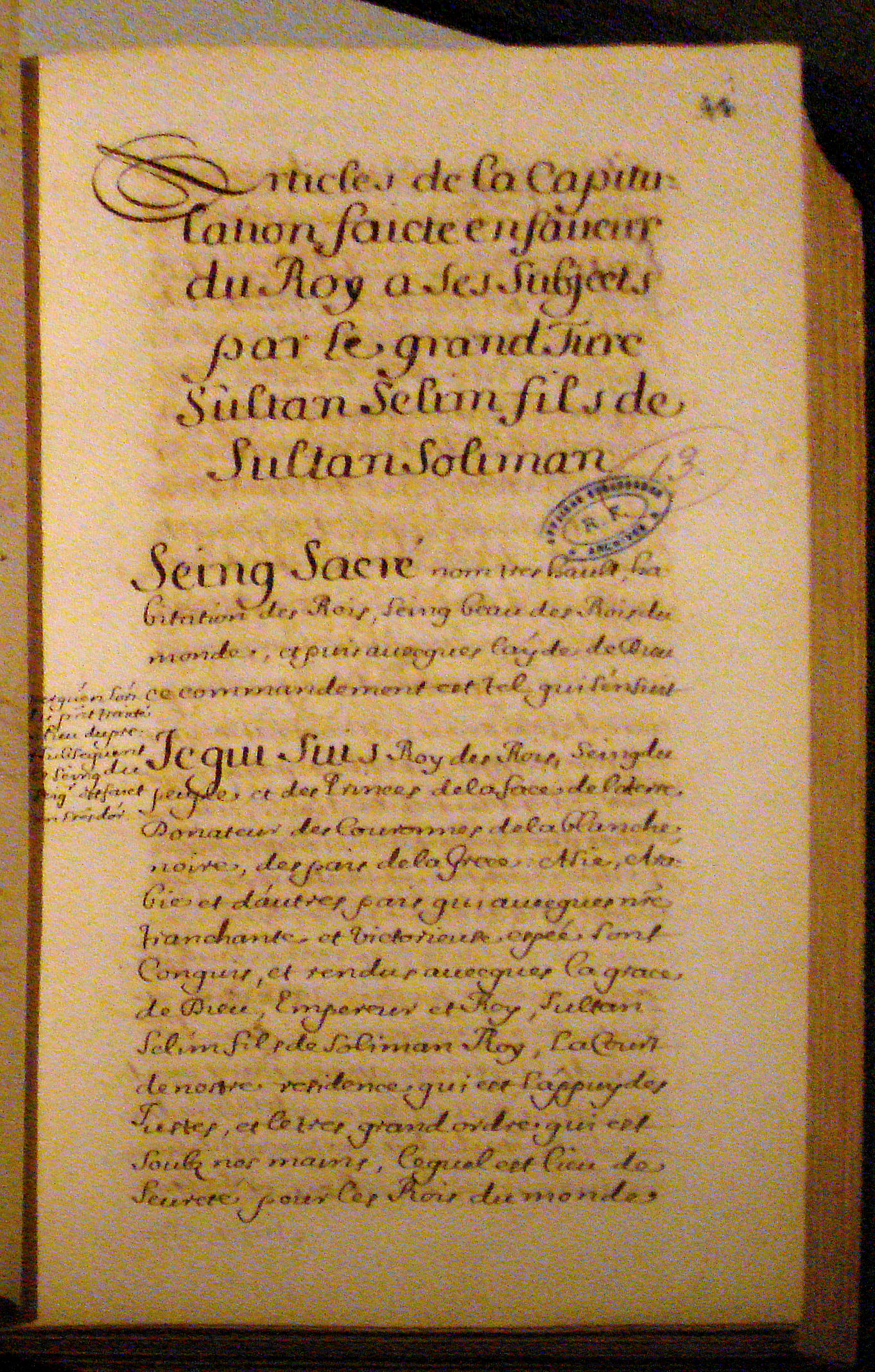Guillaume De Grandchamp De Grantrie on:
[Wikipedia]
[Google]
[Amazon]
 Guillaume de Grandchamp de Grantrie was
Guillaume de Grandchamp de Grantrie was
/ref> He offered himself to become the ''''The Papacy and the Levant'' by Kenneth M. Setton p.937
/ref> The goods were at least partially returned with the signature of the 1569 Capitulations.
 Guillaume de Grandchamp de Grantrie was
Guillaume de Grandchamp de Grantrie was French Ambassador to the Ottoman Empire
France had a permanent embassy to the Ottoman Empire beginning in 1535, during the time of King Francis I and Sultan Suleiman the Magnificent. It is considered to have been the direct predecessor of the modern-day embassy to the Republic of Tu ...
from 1566 to 1571.
From 1566, he notably proposed to the Ottoman Court a plan, devised by Charles IX of France
Charles IX (Charles Maximilien; 27 June 1550 – 30 May 1574) was King of France from 1560 until his death in 1574. He ascended the French throne upon the death of his brother Francis II in 1560, and as such was the penultimate monarch of the ...
and Catherine de Medicis, to settle French Huguenots
The Huguenots ( , also , ) were a religious group of French Protestants who held to the Reformed, or Calvinist, tradition of Protestantism. The term, which may be derived from the name of a Swiss political leader, the Genevan burgomaster Be ...
and French and German Lutherans
Lutheranism is one of the largest branches of Protestantism, identifying primarily with the theology of Martin Luther, the 16th-century German monk and reformer whose efforts to reform the theology and practice of the Catholic Church launched ...
in Moldavia
Moldavia ( ro, Moldova, or , literally "The Country of Moldavia"; in Romanian Cyrillic alphabet, Romanian Cyrillic: or ; chu, Землѧ Молдавскаѧ; el, Ἡγεμονία τῆς Μολδαβίας) is a historical region and for ...
, in order to create a military colony and a buffer against the Habsburgs. This plan also had the added advantage of removing the Huguenots from France
France (), officially the French Republic ( ), is a country primarily located in Western Europe. It also comprises of overseas regions and territories in the Americas and the Atlantic, Pacific and Indian Oceans. Its metropolitan area ...
, then a major issue due to the French Wars of Religion
The French Wars of Religion is the term which is used in reference to a period of civil war between French Catholics and Protestants, commonly called Huguenots, which lasted from 1562 to 1598. According to estimates, between two and four mi ...
.''The Ottoman Empire and the world around it'' by Suraiya Faroqhi p.37/ref> He offered himself to become the ''
Voyvoda
Voivode (, also spelled ''voievod'', ''voevod'', ''voivoda'', ''vojvoda'' or ''wojewoda'') is a title denoting a military leader or warlord in Central, Southeastern and Eastern Europe since the Early Middle Ages. It primarily referred to the ...
'' of Moldavia, who would pay a tribute of 20,000 ducats to the Ottomans.
In 1569, during the tenure of Grandchamp, the Ottomans seized French and foreign ships under French flags in order to recover a debt estimated to 150,000 Écu
The term ''écu'' () may refer to one of several French coins. The first ''écu'' was a gold coin (the ''écu d'or'') minted during the reign of Louis IX of France, in 1266. The value of the ''écu'' varied considerably over time, and silver coi ...
s or ducats that Charles IX owed to the Ottoman money-lender Joseph Nasi
Joseph Nasi (1524, Portugal – 1579, Konstantiniyye), known in Portuguese as João Miques, was a Portuguese Sephardi diplomat and administrator, member of the House of Mendes/Benveniste, nephew of Dona Gracia Mendes Nasi, and an influential fi ...
. After protests, only the French ships and goods were kept, totalling an amount of about 42,000 ducats./ref> The goods were at least partially returned with the signature of the 1569 Capitulations.
See also
*Franco-Ottoman alliance
The Franco-Ottoman Alliance, also known as the Franco-Turkish Alliance, was an alliance established in 1536 between the King of France Francis I and the Sultan of the Ottoman Empire Suleiman I. The strategic and sometimes tactical alliance was o ...
Notes
{{reflist Ambassadors of France to the Ottoman Empire 16th-century French diplomats 16th-century French people